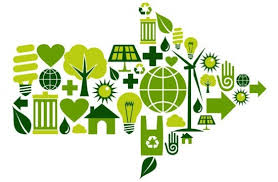Working together to create a more environmentally-aware civil service
Published in the Nr 31 - January 2021
MONTHLY FOCUS
Four years after the entry into force of the Paris Agreement, governments are working to fulfil their commitments to reducing their greenhouse gas emissions. Public administrations have an important role to play in this respect and must set an example in their choices for the protection of the environment.
As the country's largest employer, central and local authorities have a major influence on the sustainable economy. Each measure taken, applied in every department and throughout the territory, is therefore all the more effective.
In Germany, for example, the federal government has contractually agreed to stop emitting greenhouse gases by 2030, twenty years ahead of the deadline, a decision that applies to the entire country. A coordination unit is responsible for overseeing the implementation of this objective.
Air travel generates very high carbon emissions. To curb this, in early 2020, Ireland introduced a carbon tax (26 euros per tonne) on business flights taken by civil servants. It is levied on the budgets of all public services and is used to finance the country's climate transition.
Although the number of face-to-face meetings has decreased considerably over the past year due to the pandemic, some countries, such as Sweden, had already foreseen this shift for environmental reasons. Thanks to the REMM project, videoconferencing has become the norm. In addition to the tools to facilitate the use of videoconferencing, a simulator is used to calculate savings in order to raise awareness among public employees.
Given the quantities of consumables (paper, toner, etc.) used across all administrations, significantly reducing the use of these is already having a considerable impact. In 2018, Portugal decided to cut orders by 25% as a first step. This approach goes hand in hand with increased use of paperless procedures in various departments.
The UK has taken the initiative to manage its procurement chain by imposing strict rules on suppliers to ensure that all waste produced is sent for recycling. It has also decided to change staff behaviour by introducing selective sorting in offices. For a year now, Civil Service departments have been required to completely avoid dumping waste on landfill sites.
Norway has been a pioneer in this field: since 2016, it has been committed to vigorously combating deforestation. All public contracts now include a certification clause to this effect. Always on the lookout for new environmentally-friendly solutions, the country has just announced that the government's fleet of vehicles will be replaced exclusively by electric models.
Collective food services are also being addressed. The Netherlands has developed new standards for canteens and cafeterias. All utensils must comply with strict specifications, as must food and drink supply systems.
One European country that aims to become a benchmark in green digital technology is Slovenia. The capital, Ljubljana, is ranked as Europe's greenest city and the country has invested in the first "State cloud", reducing spending on energy-intensive computer servers by 27%.
In a bid to leverage the end of the crisis with an eye to encouraging the pooling of good practices and the mainstreaming of environmental policy, the European Commission has made this one of the priorities of its "A public administration fit for the future" programme, in which administrations are reminded of the importance of their role in achieving the objectives set (1).
1 The (proposed) Regulation COM(2020) 408 establishing a Recovery and Resilience Facility sets a binding target of at least 37% of the plan’s total allocation to contribute to the climate mainstreaming.
- For more information: ec.europa.eu

